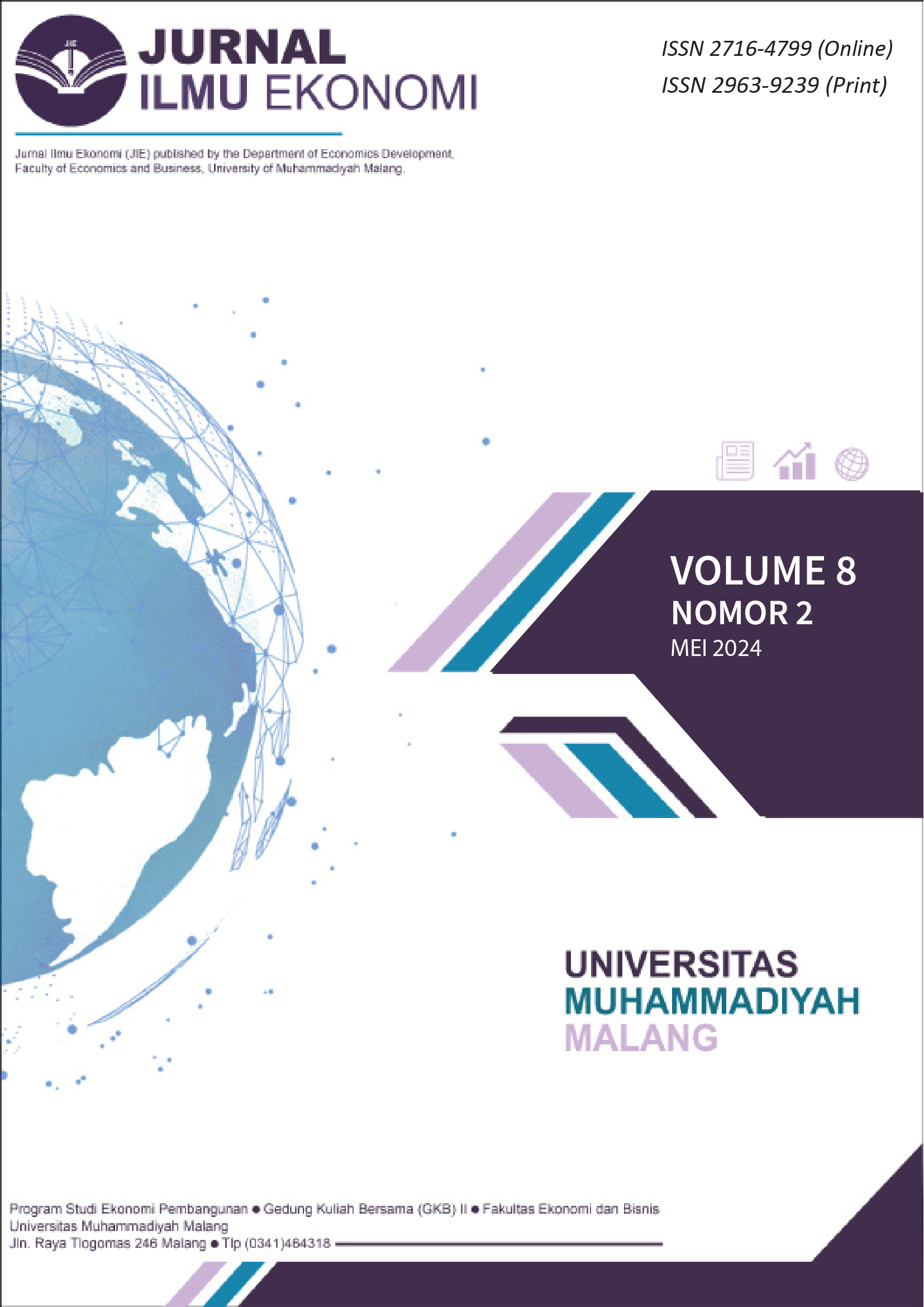Analisis Determinan Pembangunan Manusia Berbasis Gender Dan Desentralisasi Fiskal Pada Inklusifitas Pertumbuhan Ekonomi Di Provinsi Nusa Tenggara Barat
DOI:
https://doi.org/10.22219/jie.v8i02.31782Keywords:
inclusive economic growth, gender, fiscal desentralisation, unemployment rate ratioAbstract
This research aims to examine the influence of gender and fiscal decentralization on inclusive economic growth in West Nusa Tenggara Province. This research uses a panel data regression analysis method using the Fixed Effect Model approach to determine the influence of the dependent variable on the independent variable. As a result, the gender-based development index variable, namely the ratio of average years of schooling, has a positive and significant value; the ratio of life expectancy and the open unemployment rate ratio has a negative value and is not substantial; the variable of the degree of fiscal decentralization, namely the ratio of the degree of fiscal decentralization and the capital expenditure ratio, has a value positive and significant towards inclusive economic growth in West Nusa Tenggara Province.
Downloads
References
Ahmad Murad. (2019). Desentralisasi Fiskal Dan Inklusifitas Pertumbuhan Ekonomi Dikabupaten/Kota Di Ntb. Jurnal Akuntansi Dan Keuangan Syariah - ALIANSI, 2(2). https://doi.org/10.54712/aliansi.v2i2.37
AYU NIKEN PRABANDARI, D. (2018). ANALISIS INKLUSIVITAS PERTUMBUHAN EKONOMI DI JAWA TIMUR DAN FAKTOR-FAKTOR YANG MEMENGARUHINYA SKRIPSI Disusun oleh: DARA AYU NIKEN PRABANDARI 145020101111074.
Cabeza-García, L., Del Brio, E. B., & Oscanoa-Victorio, M. L. (2018). Gender factors and inclusive economic growth: The silent revolution. Sustainability (Switzerland), 10(1), 1–14. https://doi.org/10.3390/su10010121
eka pratiwi, I. (2022). DETERMINAN GENDER DAN FISKAL PADA PERTUMBUHAN EKONOMI INKLUSIF DI WILAYAH 3T (TERDEPAN TERLUAR TERTINGGAL). https://repository.uinjkt.ac.id/dspace/bitstream/123456789/68972/1/170. INDAH EKA PRATIWI_11180840000016_SKRIPSI.pdf
Hepi, & Zakiah, W. (2018). Pengaruh Angka Harapan Hidup Dan Rata-Rata Lama Sekolah Terhadap PDRB Perkapita Serta Pertumbuhan Ekonomi Di Provinsi Kalimantan Tengah Tahun 2011-2015. Journal Magister Ilmu Ekonomi Universtas Palangka Raya: Growth, 4(1), 56–68.
Hidayat, I., Mulatsih, S., & Rindayati, W. (2020). The Determinants of Inclusive Economic Growth in Yogyakarta. Jurnal Economia, 16(2), 200–210. https://doi.org/10.21831/economia.v16i2.29342
Klasen, S. (2017). Measuring and monitoring inclusive growth in developing and advanced economies: Multiple definitions, open questions and some constructive proposals. Reframing Global Social Policy: Social Investment for Sustainable and Inclusive Growth, 12, 123–144. https://doi.org/10.56687/9781447332503-010
Makua, K. B., Malungane, N., Mswephu, K., & Sadiki, R. C. (2022). Does Gender Inclusivity Matter for Economic Growth in South Africa? An ARDL approach. Journal of Economics, Business, & Accountancy Ventura, 25(2), 180. https://doi.org/10.14414/jebav.v25i2.3123
Waryanto, P. (2017). Pengaruh Belanja Modal Terhadap Pertumbuhan Ekonomi di Indonesia. Indonesian Treasury Review Jurnal Perbendaharaan Keuangan Negara Dan Kebijakan Publik, 2(1), 35–55. https://doi.org/10.33105/itrev.v2i1.13
Yulia sindi, S. (2022). Pengaruh Efisiensi Belanja Modal Terhadap Pertumbuhan Ekonomi Inklusif Dan Kualitas Sumber Daya Manusia Di Provinsi Jawa Timur 2017-2021. http://repository.ub.ac.id/id/eprint/202204
Downloads
Published
How to Cite
Issue
Section
License
Copyright (c) 2024 Hevi Novita Ramandani

This work is licensed under a Creative Commons Attribution-NonCommercial-ShareAlike 4.0 International License.
Authors who publish with this journal agree to the following terms:
- For all articles published in the JIE (Jurnal Ilmu Ekonomi), copyright is retained by the authors. Authors give permission to the publisher to announce the work with conditions. When the manuscript is accepted for publication, the authors agree to the automatic transfer of non-exclusive publishing rights to the publisher.
- Authors retain copyright and grant the journal right of first publication with the work simultaneously licensed under a Creative Commons Attribution-NonCommercial-ShareAlike 4.0 International License that allows others to share the work with an acknowledgement of the work's authorship and initial publication in this journal.
- Authors are able to enter into separate, additional contractual arrangements for the non-exclusive distribution of the journal's published version of the work (e.g., post it to an institutional repository or publish it in a book), with an acknowledgement of its initial publication in this journal.
- Authors are permitted and encouraged to post their work online (e.g., in institutional repositories or on their website) prior to and during the submission process, as it can lead to productive exchanges, as well as earlier and greater citation of published work (See The Effect of Open Access).
This is an open access article and licensed under a Creative Commons Attribution-NonCommercial-ShareAlike 4.0 International License








